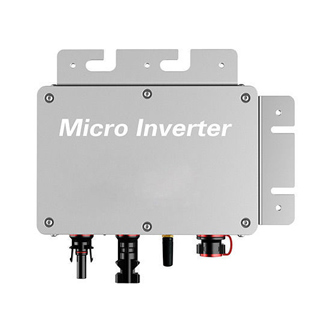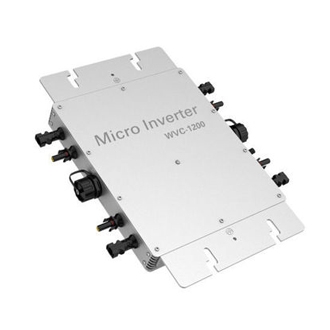When it comes to solar energy systems, inverters play a crucial role in converting the direct current (DC) electricity generated by solar panels into the alternating current (AC) electricity used in homes and businesses. Two common types of inverters used in photovoltaic (PV) systems are microinverters and string inverters. In this comprehensive blog post, we will delve into the differences between microinverters and string inverters to help you understand which one may be more suitable for your solar installation.

Microinverters
Microinverter is a kind of solar inverter. Microinverters are designed to be installed on a per-panel basis. This means that each solar panel in your array has its own microinverter. Here are some key features and advantages of microinverters:
-
Individual Panel Optimization: One of the standout features of microinverters is their ability to optimize the performance of each solar panel independently. With a microinverter system, each panel operates at its maximum capacity, which can significantly improve energy production. In contrast, string inverters connect multiple panels in a series, and the output of the entire string is limited by the lowest-performing panel.
-
Shade Tolerance: Microinverters are excellent at mitigating the effects of shading. If one panel is partially shaded, it won't affect the output of the other panels in the array. In a string inverter system, shading on one panel can reduce the overall performance of the entire string.
-
Monitoring: Many microinverter systems offer advanced monitoring capabilities that allow you to track the performance of each panel individually. This detailed data can help you identify and address issues more effectively.
-
Safety: Microinverters operate at lower voltages compared to string inverters, which can enhance safety during installation and maintenance.
-
Scalability: Microinverter systems are highly scalable. You can start with a small array and expand it easily by adding more panels and microinverters as needed.
String Inverters
String inverters, on the other hand, are typically installed as a single unit that is connected to multiple solar panels in a series. Here are the characteristics and advantages of string inverters:
-
Cost-Effective: String inverters are generally more cost-effective on a per-panel basis compared to microinverters. They are a popular choice for larger solar installations, where the cost savings can be substantial.
-
Simplicity: The installation of string inverters is simpler and requires fewer components, making it a preferred choice for many installers.
-
Reliability: While microinverters have more points of potential failure (one per panel), string inverters have a single point of failure. However, string inverters are known for their reliability, and the single-inverter design means fewer components to maintain.
-
Commercial Applications: String inverters are often used in commercial solar installations where the number of panels is higher, and cost considerations are a significant factor.

Choosing the Right Inverter for Your System
The choice between microinverters and string inverters depends on various factors:
-
System Size: For smaller residential installations, microinverters can provide superior performance. For larger systems, string inverters may be more cost-effective.
-
Shading: If your installation is prone to shading from trees, nearby buildings, or other obstructions, microinverters are an excellent choice.
-
Budget: Your budget will play a significant role in the decision. Microinverters are more expensive on a per-panel basis, but their advantages may justify the cost.
-
Maintenance: Consider how much maintenance you're willing to undertake. Microinverters offer more detailed monitoring but have more components to maintain.
In conclusion, the choice between microinverters and string inverters is not one-size-fits-all. Your specific needs, budget, and shading conditions will guide your decision. It's important to consult with a qualified solar installer who can assess your situation and recommend the best inverter solution for your solar energy system. Both microinverters and string inverters have their strengths and weaknesses, and the right choice can make a significant difference in the performance of your solar array.
